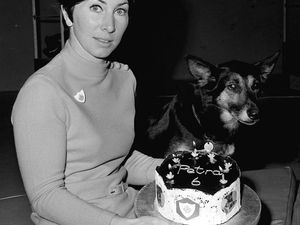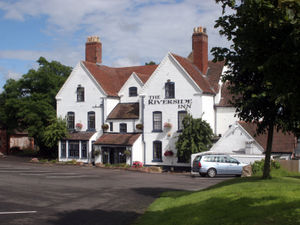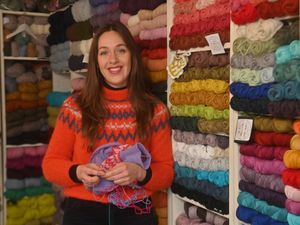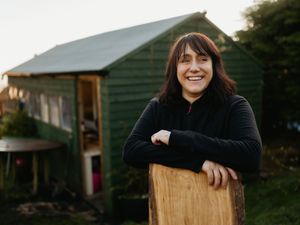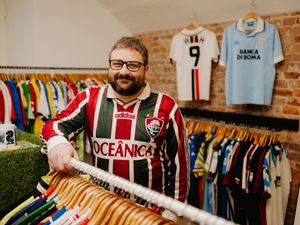Ray Mears: The world is full of too much conflict
When it comes to a battle of survival, Ray Mears is the man you’d want by your side. He talks TV, Mother Nature and his wild life. . .
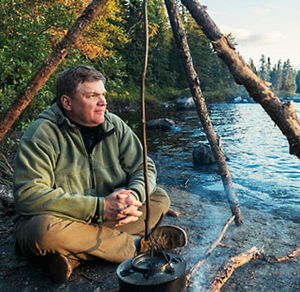
He started out in The City. And that, if you think about it, makes perfect sense. For survival skills are at a premium when you’re swimming with sharks in London’s Square Mile.
That career didn’t last long and soon Ray Mears had formed his own business, Woodlore, offering Bushcraft-related courses. Founding his own business was daunting – 34 years later, it still is.
“You have to make a lot of sacrifices. There’s no light at the end of the tunnel – and then, after a while, you realise there’s not going to be, so you might as well enjoy the journey. It’s a challenge. But I love meeting people and hearing how bushcraft has improved and enhanced their lives. That’s what my business is about.”
These days, Ray doesn’t fear for nature. Despite climate change, commercial trade, habitat loss, pollution, pesticides, competition from invasive species and wildlife extinctions, Britain’s most intrepid man, thinks Planet Earth will be just fine. Though more species will be lost and ecosystems will be scorched by a warming planet, over-population and freak weather, Mother Nature isn’t what’s at risk. It’s us.
“Nature is quite good at modifying and adapting and changing. So I don’t think nature is at threat. Some ecospecies and species are massively threatened by human activity, like the rhino. But ultimately, it’s humanity that is fragile because we depend on nature. If we damage nature behind our own capacity to support it, then we are in trouble. We need nature for our own survival.”
Ray is a fascinating man. A woodsman, businessman, author and TV presenter, he’s the geek who’s cool to like; the survival expert who brings the wilderness into our front rooms. Hell, he can track a bear, wolf or leopard. And that’s impressive. Even his taste in music is faultless: his Desert Island Discs included tracks by the Rolling Stones, The Beatles, The Jam, Blondie and Nina Simone.
Ray wanted to be a Marine, but wasn’t clever enough for the extrance exam. Improbably, he worked in the City for a short while but then got bored and founded a company that offered Bushcraft courses. Survival is in his blood. It’s been his lifelong passion.
Woodlore became so successful that Ray gained a trademark for his name. By 1994, he’d earned his first TV deal and was presenting the BBC series Tracks. The show was a hit and showcased Ray talent. Within three years, he’d been commissioned to film Ray Mears’ World of Survival and soon after Ray Mears’ Extreme Survival. He took Ewan McGregor into the Honduran jungle on the trail of the Mosquito Coast and filmed a series of shows about bushcraft and wild food. The Australian Outback, Northern Wilderness and other remote parts of the world were brought into our homes by the broadcaster and author, whose programmes illustrated both the harshness of nature and man’s ability to adapt and survive.
More recently, he’s returned to Australia to film another series about places that most consider inaccessible.
“We made a series in Australia a couple of years ago that was successful so we decided to go back to do more. This series I’m seeing places that I’ve been to before. I’m also going to places that I’ve not been to before. I filmed on Kangaroo Island in The Flinders, which was staggering. It’s in the very south west of Australia. We also looked at reefs. Everyone thinks of the Great Barrer Reef when they think of Australia but there are also these incredible reefs right on shore. I got to swim with whale sharks, which was incredible.”
Making such programmes isn’t easy. Though Ray feels safe in locations that others might consider dangerous, there are great challenges in terms of research and project management. He has to know where to find the exciting stuff, know how to find it quickly and be able to transport a film crew with him so that they can capture every action. It’s not easy.
“It’s a big job to research these shows. But the most important thing is the field craft on the ground. In Flinders there were spiders around me and these are things you can’t plan for. You need to have experience so that you know what to do. Personally, I don’t think The Bush is full of threats and dangers. Everybody thinks that it is but it’s not. You don’t have to be fearful, you just have to learn.
“The biggest problem that we have is that these programmes are made so quickly. We can be in locations and only have two days filming. So every six hours we have to find something unusual and film it. But we have an amazing team with great naturalists with good fieldcraft skills.
“I don’t worry about places in terms of the inaccessibility, that’s quite straight forward. We are able to get to pretty much anywhere. The difficult thing is spotting things when we’re there.”
Ray’s shows tend to run to 30 minutes, with some lasting an hour. And while he’s grateful for the opportunity to show his audience of millions a different side to the world, he sometimes wishes the shows would last longer. He fears that his audience gets no more than bite-sized chunks and is unable to enjoy a lengthier and more intellectually-engaging view of nature.
“Yes, the programmes are very short. We could be making much longer programmes but I still really enjoyed making them. The wildlife is great fun and it’s a big part of what I do. Sometimes I can’t show viewers the wildlife as well as the bushcraft, there’s not enough time.”
He finds his work humbling. For though life in the western world moves at an ever faster pace and people become more and more dependent on tablets, phones, PCs and other technology, Mother Nature moves to a different beat. Ever-changing, continually adapting to new threats and dangers, it provides a point of difference, a reminder that man is merely a cog in a bigger wheel.
“It’s humbling, yes, massively so. When you visit these places, you understand your place in the universe. I think my viewers do go out and do some of the Bushcraft or spotting. They are doers, rather than talkers, and the more we can encourage people the better.”
In addition to his TV shows and books – there have been 13 to date, with the more recent, Out on the Land: Bushcraft Skills from the Northern Forest, published in 2016 – Ray regularly hits the road to talk to fans. His next tour, The Joy Of Travelling In Wild Places, opens on October 8 and continues until November 16. It includes a date at Birmingham Town Hall on November 7.
With a theme of the enjoyment of wild places Mears will give audiences a unique insight into his wilderness travels and survival techniques. He will include tales of his most recent visits to Australia, where he looked at the extraordinary conditions endured by the indigenous wildlife and will take the opportunity to talk extensively about fire, what it means to humanity and the essential role it plays in our survival.
Ray, who famously survived a helicopter crash when filming his first TV series in the early 90s and helped Northumbria police track down Raoul Moat one of the UK’s most notorious criminals during an undercover operation in 2010, has been discovering the joys of exploring the wilderness from an early age.
His talk will reveal how he remains fascinated by those wild areas of the planet that are as yet undisturbed by civilised human activity. His fascination with this environment has shaped his life and established him as a leading voice in this field.
Ray will take audiences on a journey that he values for cultural, spiritual, moral and aesthetic reasons and explain why he believes these are vital for creativity and the development of the human spirit. His down-to-earth approach, obvious passion for his subject and empathy and respect he shows for the natural world and its inhabitants will make it an enjoyable tour.
“The show will be in two parts. I’ve spent 35 years teaching Bushcraft so I’ll look at some of those skills. I want to make fire on stage – don’t worry, I’ve delegated all the health and safety stuff.
“In the second half, I’ll talk about the importance of observing nature. I’ll use footage from Australia and it’ll be a fun evening.”
Ray enjoys his talks as much as he enjoys making TV shows and writing books. For while the latter are largely solo pursuits – albeit it that they involve a small and highly-skilled team – the former is a collective experience during which he finds out what his audience really thinks.
“I love meeting the viewers. It helps me to confirm whether or not I’m still in touch with what they want. I think what’s great about these wildlife shows is that it’s down to what the viewers think.”
Ray has led a truly remarkable life and still pinches himself when he considers his achievements. He didn’t intend things to turn out the way they have, nor did he imagine his business would be as successful as it has. He’s continually learning and enjoys the fact that he still has a long way to go. His courses, where he can pass on skills one-on-one, are where his heart still lies.
“When I started teaching, I didn’t know anything really. I knew more than others but not as much as I needed to know. So it was hard work and I had to do every job. Like anyone who starts something, you need to be on top of it.
“The courses are life-changing for some of the people who sign up. This year, we even had a Canadian Indian on a course.”
And yet the power of television meant that his documentary films are hugely important. They are the way in which he passes on his message and connects with several million people.
“TV is fun and it helps spread the message. It’s opened up opportunities to see things that I wouldn’t have otherwise seen. Many of the old timers, the tribal people, have gone. It’s important that we film these places and these people.”
It’s perhaps not surprising that Ray has the greatest respect for the people he films – rather than the people who watch his shows. He hopes that his subjects are happy with his work and that it is authentic and accurate. If he achieves that aim, he can be sure the general public will enjoy it.
“When I make a film with any cultural, Aboriginal people, they are my most important audience. The film is for British TV, of course, but I’m not interested in that. I’m interested in the Aboriginal people seeing themselves in the future and being happy with the way they are portrayed. The highest praise I ever received was from an Inuit from Yellow Knife. He recognised me and told me that I told it like it is.”
The central point to his work is that we are standing on the shoulders of giants. Had it not been for the indigenous people who carved out lives in the most difficult circumstances, hundreds or thousands of years ago, we would not be here.
“Bushcraft is about giving. Without it, we wouldn’t be where we are today. We are standing on the shoulders of those who’ve gone before. I always treat people the way I’d like to be treated myself. It’s quite simple, I have old-fashioned values. I listen to what people tell me very carefully and I do my homework.
“So, for instance, if I’m in Canada, I’ll make sure I’ve researched what’s brought them to where they are today. We can’t right the problems of the past but we can make a better job of understanding what has happened. We try to choose crews who will be sensitive to communities that we are working with.
“We have such short time to make films and working with tribal people takes time and patience. For me, as a presenter, we are there for such a short space of time so I have to work hard and be giving of my time so that that interface between cultures is properly made.”
He is well placed to comment on our future. He understands better than most where we came from – and that is as sure an indicator of where we are headed as there is.
“There is too much conflict. We are arguing over things that we shouldn’t be arguing over and we are not good at celebrating our differences. That’s a great pity because the world is made interesting because people are not the same.
“We are becoming more and more similar because of technology and that is a shame. We need to learn to celebrate our diversity and our differences – that is what makes us what we are.”
Andy Richardson
l Ray Mears will be at Birmingham Town Hall on November 7 and tickets are available at www.thsh.co.uk

